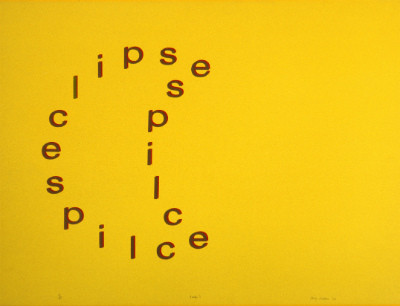Born to Concrete
Heide II till 25 September

Heide Museum has a distinct relationship with Australian poetry. Formerly Heide was the residence of John and Sunday Reed. John was the publisher of Angry Penguins, and so Heide became one of the nodes of the Ern Malley saga.
Poet and editor of overland Barrett Reid also lived at Heide. More pertinently for this post is the fact that the Reed's adopted son Sweeney grew up there and became a concrete poet and poetry publisher. His work forms part - you could say the heart - of the Heide collection of concrete poetry. Reed made explicit use of both Stein and cummings in his poetry; the influence of Ian Hamilton Finlay is also apparent. Reed had plans to collaborate with Finlay when he died in 1979. Though not, apparently, prolific his conceptually dense works suggest a commitment to both the construction of his work, and the construction of a place for his work within poetry (rather than within art which was the more immediate influence: his adoptive parents being art patrons and early supporters of Sidney Nolan, who also lived at Heide. Reed's biological parents, Joy Hester and Albert Tucker were also painters).

Born to Concrete is, according to director Jason Smith, the most comprehensive exhibition of Heide's concrete poetry collection so far. It includes work by Reed, Alan Riddell, Ruth Cowen, Jas H Duke, Ian Hamilton Finlay, Alex Selenitsch, Peter Murphy, Mike Parr, Richard Tipping, Aleks Danko and TT. O. I was particularly taken with Duke's intriguing sampler of scores (an extract from an apparently longer series), and Selenitsch's updates of Reed's 'Horizon' work.
Concrete poetry, despite the overlap with poetry in verse, (and art), generally seems to operate in another dimension. The early deaths of Reed and Duke contribute to that impression. Cowen and Riddell are mysterious: Cowen otherwise unknown to me; Riddell died in Scotland after editing a quite amazing book Typewriter Art. As visual aspects of poetry become more popular there's a real excitement in discovering the visual apects of poetry's heritage.
This isn't meant to be a puff piece, but I think it's fantastic that Heide and curators Katarina Paseta and Linda Short have made this aspect of local poetry accessible - in the true sense - to the public.
A talk on Sweeney Reed and his involvement with Ian Hamilton Finlay will be given by Linda Short at Heide on July 31 at 2pm
Australia, Fitzroy